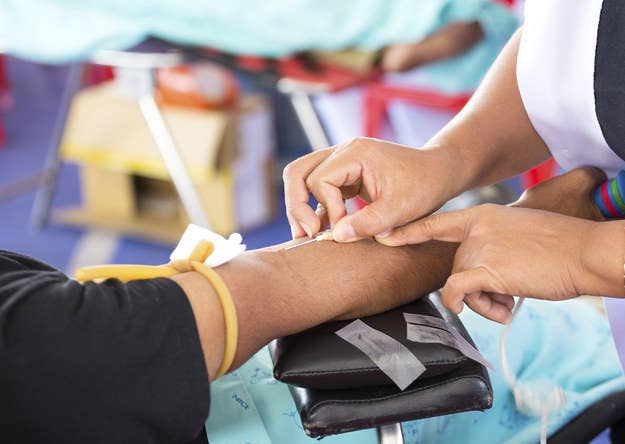
Along with 78 other congressional Democrats, Senators Elizabeth Warren and Tammy Baldwin pressed the Obama administration Monday to lift a ban on gay men donating blood, describing the 1983 policy as an archaic and scientifically unjustified barrier to getting blood to those who need it.
"[W]e must embrace science and reject outdated stereotypes," the lawmakers wrote in a strongly worded letter to Secretary of Health and Human Services Sylvia Burwell.
In particular, lawmakers were responding to a November recommendation by the Health and Human Services' Advisory Committee on Blood & Tissue Safety & Availability. The committee advised relaxing the lifetime ban to instead ban donations from men who have had sex with men in the previous year. Even that one-year deferral, the lawmakers said, "would, in practice, leave that lifetime ban in place for the vast majority of [men who have sex with men], even those who are healthy and low-risk. Both policies are discriminatory, and both approaches are unacceptable."
The bicameral letter said the ban should be replaced by a "risk-based blood donation policy," not one based on sexual orientation.
The lawmakers went on to decry the committee's advice that the country create a new national blood-screening system before the ban is reduced to a yearlong deferral. The lawmakers support a comprehensive surveillance system, they said, but making it a prerequisite would constitute an "arbitrary condition that will inevitably result in further delays." They explained, "This system has never before been deemed necessary to allow any other group of individuals to donate — including those that carry a much higher-risk of transmitting an infection."
The lawmakers addressed a common objection to reforming the ban: that gay men tend to be higher carriers of HIV, the virus that can lead to AIDS. "The pertinent scientific question is not whether a cross-section of the population is more likely than another to transmit an infection," they wrote, "but rather whether an across-the-board, risk-based screening will reduce the likelihood of all infectious contaminations."
They point out leaders of the the scientific, medical, and blood-donation community, including the American Medical Association, broadly support repealing the ban.
The ban has also been construed broadly to apply to many transgender people.
Many of the same congresspeople signed on to two previous letters on the matter, one in September and another in 2013. In contrast, the previous letters focused on questions about the process for reconsidering the ban, whereas this latest missive explicitly lays out the lawmakers' policy platform and asks Secretary Burwell several pointed questions. Among the questions: Will Burwell "commit to replacing the lifetime deferral policy by the end of 2014?" And if a blood-screening network is established, when would it be functional, and would it need to be up and running to roll back the ban?
The lawmakers ask Burwell to respond by Dec. 22.
The congresspeople did not address an arguably more regressive development. An FDA advisory committee, which considered the ban on Dec. 2, made no recommendation. BuzzFeed News reported Friday that the committee will not meet again to consider the matter. The final decision appears to lie with Secretary Burwell and the FDA. An FDA spokesperson gave no timeline for any such decision.
